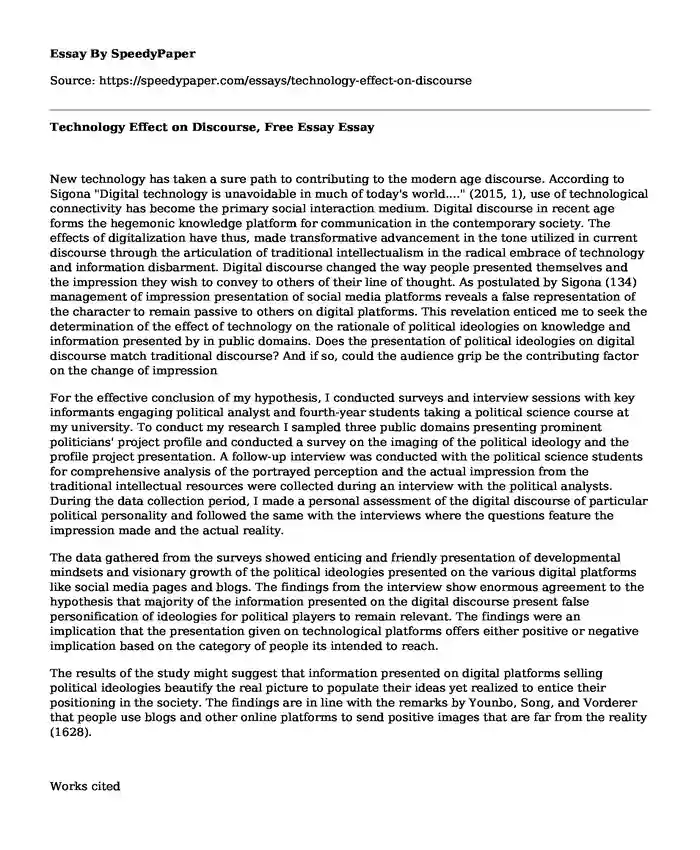
| Type of paper: | Essay |
| Categories: | Social networks Political science Social media |
| Pages: | 3 |
| Wordcount: | 574 words |
New technology has taken a sure path to contributing to the modern age discourse. According to Sigona "Digital technology is unavoidable in much of today's world...." (2015, 1), use of technological connectivity has become the primary social interaction medium. Digital discourse in recent age forms the hegemonic knowledge platform for communication in the contemporary society. The effects of digitalization have thus, made transformative advancement in the tone utilized in current discourse through the articulation of traditional intellectualism in the radical embrace of technology and information disbarment. Digital discourse changed the way people presented themselves and the impression they wish to convey to others of their line of thought. As postulated by Sigona (134) management of impression presentation of social media platforms reveals a false representation of the character to remain passive to others on digital platforms. This revelation enticed me to seek the determination of the effect of technology on the rationale of political ideologies on knowledge and information presented by in public domains. Does the presentation of political ideologies on digital discourse match traditional discourse? And if so, could the audience grip be the contributing factor on the change of impression
For the effective conclusion of my hypothesis, I conducted surveys and interview sessions with key informants engaging political analyst and fourth-year students taking a political science course at my university. To conduct my research I sampled three public domains presenting prominent politicians' project profile and conducted a survey on the imaging of the political ideology and the profile project presentation. A follow-up interview was conducted with the political science students for comprehensive analysis of the portrayed perception and the actual impression from the traditional intellectual resources were collected during an interview with the political analysts. During the data collection period, I made a personal assessment of the digital discourse of particular political personality and followed the same with the interviews where the questions feature the impression made and the actual reality.
The data gathered from the surveys showed enticing and friendly presentation of developmental mindsets and visionary growth of the political ideologies presented on the various digital platforms like social media pages and blogs. The findings from the interview show enormous agreement to the hypothesis that majority of the information presented on the digital discourse present false personification of ideologies for political players to remain relevant. The findings were an implication that the presentation given on technological platforms offers either positive or negative implication based on the category of people its intended to reach.
The results of the study might suggest that information presented on digital platforms selling political ideologies beautify the real picture to populate their ideas yet realized to entice their positioning in the society. The findings are in line with the remarks by Younbo, Song, and Vorderer that people use blogs and other online platforms to send positive images that are far from the reality (1628).
Works cited
Chen, Baiyun and Justin Marcus. "Students' Self-presentation on Facebook: An Examination of Personality and Self-construal Factors." Edited by Sigona Annalise, Computers in Human Behavior 28.6 (2012): 2091-99. Print
Jung, Younbo, Hayeon Song, and Peter Vorderer. "Why do People Post and Read Personal Messages in Public? The Motivation of Using Personal Blogs and its Effects on Users' Loneliness, Belonging, and Well-being." Edited by Sigona Annalise, Computers in Human Behavior 28.5 (2012): 1626-33.
Sigona, Annalise. Impression Management on Facebook and Twitter: Where Are People More Likely to Share Positivity or Negativity with Their Audiences? Young Scholars in Writing, 2015, 134 - 141.
Cite this page
Technology Effect on Discourse, Free Essay. (2022, Apr 25). Retrieved from https://speedypaper.com/essays/technology-effect-on-discourse
Request Removal
If you are the original author of this essay and no longer wish to have it published on the SpeedyPaper website, please click below to request its removal:
- Two Simple Tricks to Improve Your Study Habits, Free Essay in Education
- Essay Example Containing Political Psychology Questions
- Life Through a Midwife's Eyes - Free Essay on A Midwife's Tale
- Essay Example on Kip Kinkel's Case Theories
- Free Essay Example: Theories, Principles, and Models of Assessment
- Essay Sample on Expanding a Business Model
- Free Paper Sample on Educational Policy
Popular categories




